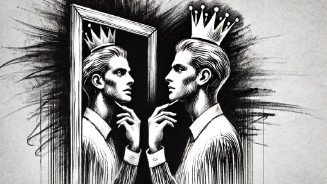NARCISSISTIC GASLIGHTING: Recognizing the Subtle Signs in Relationships
Protecting Yourself from the Emotional Manipulation of a Narcissist

It seems like you’re living with two different people? One minute, your partner is charming and generous, the next, they’re dismissive and cruel.
If this sounds familiar, you’re not alone. This behavior can be incredibly confusing, leaving you questioning your reality.
But here’s the thing: this is a common tactic used by narcissists to control and manipulate their partners.
I remember the first time I realized something was wrong. My friend Sarah confided in me about her husband, Jake.
At parties, Jake was the life of the event. He remembered everyone’s name, paid the bill, and helped elderly guests with their coats.
But at home, he was a different person entirely. Sarah often felt belittled and dismissed. She was constantly questioning her own sanity.
Sound familiar? Let’s dive into this phenomenon and uncover why it happens and what you can do about it.
👇
What is Gaslighting?
Gaslighting is a form of emotional abuse where someone denies your reality.
It might sound like, “That never happened,” or “You’re being too sensitive.” Over time, this can make you doubt your own perceptions and memories.
In Sarah’s case, Jake’s public charm and private cruelty left her constantly second-guessing herself.
The Public vs. Private Persona
Let me give you an example: You’re at a family gathering, and your partner, let’s call him Tom, is the epitome of charm.
He’s helping your grandmother with her chair, cracking jokes, and everyone loves him. But as soon as you get home, Tom’s face changes.
He’s cold, dismissive, and even cruel. This back-and-forth behavior is not a coincidence. It’s a calculated tactic.
Tom, like many narcissists, needs admiration from others.
This is known as narcissistic supply. In public, he can maintain his charming facade to gather this admiration. But this act is exhausting, and once he’s in private, he drops the mask, revealing his true self.
The Impact on You
This dual behavior is more than confusing; it’s damaging. Sarah felt trapped in a cycle of confusion and self-doubt. She was constantly trying to reconcile the two versions of Jake.
Was he the charming man her friends adored or the critical husband she lived with?
This kind of manipulation is designed to make you question your reality and, ultimately, blame yourself for the relationship’s problems.
Why Do They Do It?
Narcissists thrive on admiration but struggle with genuine intimacy. For them, maintaining a charming persona in public is a way to secure their narcissistic supply.
But true closeness makes them uncomfortable, leading to contempt and cruelty when they’re in private.
This cycle of public charm and private abuse keeps their partners in a constant state of confusion and insecurity.
Real-Life Examples
Let’s look at another example. Emma’s boss, Karen, was the perfect mentor in meetings. She praised Emma’s work, smiled, and even bought lunch for the team.
But in private, Karen was a nightmare. She criticized Emma relentlessly, undermined her confidence, and made her dread going to work.
Emma felt trapped because her colleagues saw Karen as a wonderful leader.
Emma’s experience at work mirrored Sarah’s experience at home. Both felt isolated and doubted their own perceptions because the narcissist’s public persona was so convincing.
What Can You Do?
-
Trust Your Instincts: If you feel something is off, trust yourself. You know your reality better than anyone else.
-
Document the Behavior: Keep a journal of the different behaviors you witness. This can help you see patterns and validate your feelings.
-
Seek Support: Talk to trusted friends or a therapist about what you’re experiencing. They can provide perspective and support.
-
Set Boundaries: Learn to set and enforce boundaries with the narcissist. This can help protect your emotional well-being.
-
Educate Yourself: The more you understand about narcissistic behavior and gaslighting, the better equipped you’ll be to handle it.
Recognizing the Pattern
Understanding this pattern of behavior is so important for you to not get lost in a situation like this.
When people like Sarah and Emma come forward about their experiences, listen and believe them.
The charming facade of a narcissist can be very convincing, but it’s just that—a facade.
Why Support Matters
Having a support system is essential. When you feel isolated and confused, knowing there are people who believe and support you can make all the difference.
For Sarah, talking to her friend opened her eyes to Jake’s manipulation.
For Emma, confiding in a colleague helped her regain some confidence.
Breaking the Cycle
Breaking free from a narcissistic relationship is challenging but possible.
It starts with recognizing the behavior for what it is—abuse.
Once you see the pattern, you can begin to take steps to protect yourself and, ultimately, leave the toxic relationship.
A Final Thought
If you’re in a relationship with someone who seems like two different people, keep in mind that you’re not alone.
The confusion, the self-doubt, the emotional rollercoaster—it’s all part of the narcissist’s playbook.
But believe me when I say this: “You can break free.” Trust yourself, seek support, and take action to reclaim your life.
You deserve to be with someone who treats you with consistent respect and kindness, both in public and in private. 🌟
Your Next Steps 👇
-
Reach Out for Help: If you’re feeling overwhelmed, reach out to a therapist or a support group.
-
Educate Yourself: Read books and articles on narcissistic abuse to better understand what you’re dealing with.
-
Practice Self-Care: Take time for yourself to do things that make you happy and reduce stress.
-
Plan Your Exit: If you’re ready to leave, make a plan. Ensure you have the support and resources you need.
To wrap up, and I cannot stress this enough: recognizing the problem is the first step towards solving it.
Yes, my friend, you do have the strength and courage to take control of your life. Don’t let anyone make you doubt your worth. 💪
Spot their Tricks and How Narcissists Play their Mind Games to Control You







